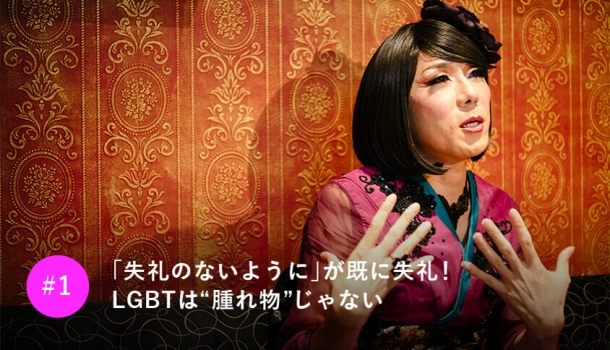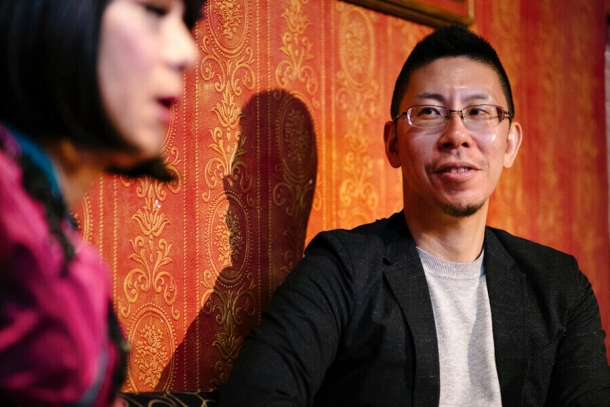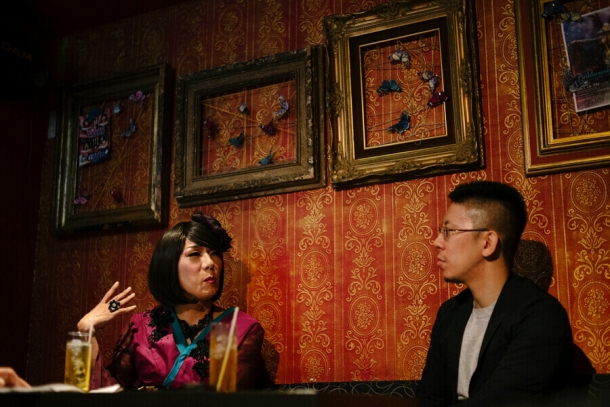In recent years we have witnessed the rise of “onee talent” Matsuko Deluxe to the status of household name and the breakout success of unconventional television series What Did You Eat Yesterday? (TV Tokyo), which depicts the everyday life of a gay couple,and Osan’s Love(TV Asahi), which depicts a love triangle between three men. Furthermore, the popularity of international reality shows RuPaul’s Drag Raceand Queer Eye(Netflix) reveals that sexual minorities, who once lived in the shadows, have gradually become more accepted. This trend can be seen at Waseda University, which, in 2017, established the GS Center, a support center for gender and sexuality.
How do sexual minorities, who have experienced this apparent change in how they are perceived —from“special” to “normal” —view this trend? To find out, we met with Waseda alumnus Bourbonne —drag queen, producer of Campy! bar in Shinjuku Ni-chome, and general moderator of the sexual minority festival Tokyo Rainbow Pride —and Noritaka Moriyama, queerstudies specialist and Associate Professor at the Faculty of Letters, Arts and Sciences.
Please join us for this special, which is the culmination of numerous discussions in the editing room and extensive research on sexual minorities.

#1 “Trying tobe inoffensive” is already offensive! The LGBT Community Doesn’t Need to be Pampered
Q. In preparation of this interview, I familiarized myself with various information regarding sexual minorities so that I don’t saying anything offensive.
Bourbonne
Hmm…Recently, a lot of people who come to my bar, or come hear me speak, say they don’t want to be “offensive.” But don’t sentiments such as “you can’t hurt their feelings,” or “you can’t be offensive,” sound like you’re trying to pamper them?
I think it’s better to focus on the positive aspects of getting to know the LGBT community, namely, that it will expand one’s worldview. It’s fun to get to know people who differ from you, and, as a result, expand your perspective, don’t you think?
Moriyama
I think there are a lot of people, including myself, who feel that comments such as “isn’t this offensive?” only serve to create distance between people. I wonder if there’s a way for us to speak to each other more candidly.

Q. …it seems I’ve already put my foot in my mouth.
Bourbonne
But this might be more due to the media environment of the past 10 years. Because we’ve constantly been told that so and so amounts to “discrimination,” we’ve been led to think that we must speak in a way that doesn’t offend anyone. With that said, it’s not wrong to point it out when something is discriminatory.
However, this might be why we’re less interested in the depths of sexuality and more focused on not offending anyone. In some cases, there’s not a black-and-white answer to whether something is discriminatory or offensive. People aren’t monoliths.
There are people who always angry, who say things such as, “Straight people just don’t get it!” But there are also those like myself, who try to create space in the media. There’s no right answer to this, though. Sometimes it’s important to use anger to cut through on certain issues.
After all, people have different presumptions and ways of thinking, and there is an infinite variety of ways to communicate information. For example, I adjust the way I speak depending on the situation, whether I’m speaking earnestly, on a variety television show, or at a local community center with an audience comprised of mostly older folks.
Q. I think it’s true that straight people tend to be wary of committing potential blunders when speaking with LGBT.
Bourbonne
I think people would be more relaxed if they didn’t spend so much energy on worrying about what is discriminatory or offensive, but rather on what brings joy to the person they’re speaking with and what brings both of them together. However, Japanese people tend to focus on avoiding mistakes…
Moriyama
I’m one of those who is always angry, saying things like, “That’s discrimination!” But I always follow this up, adding that it’s not simply a matter of words. It reminds me of something I’ve experienced lately. A lot of students have come to me, asking if it’s okay to use the word “onee.” This word encompasses varying forms of sexuality, so I don’t recommend using it, but, depending on the context, the word can be used as a term of endearment or as an insult. It’s not simply a matter of “this word is bad and this word is good.”
Bourbonne
People only pay attention to the words. When one magazine used the term “homo shacho (president)” to refer to the president of my organization, Campy, the publisher reprimanded them, claiming the term was discriminatory. As a result, it was changed to “gay shacho.” For me and the president, “homo shacho” was perfect, but the nuance is completely different, right?

Of course, I would never use “homo” to refer to someone I don’t know, but when referring to people in my inner circle, I think it’s perfectly appropriate that I use it. For instance, there are LGBT who are upset that the word “okama” has become taboo. Don’t you think it’s strange to take away the rights of adults to use certain words?
Especially within the context of sexuality, which represents a spectrum, I don’t want to view things in such a black-and-white way, claiming that “gay” is good and “homo” is bad.
If you view things from the outside and try to simply remove controversial aspects of a certain concept, you end up taking away the nuance. This doesn’t only apply to LGBT. It applies to all forms of discriminatory language. I think it’s a big mistake to think that you’re in the clear just because you don’t use certain words.
[#2] Tiptoeing Around Landmines: LGBT and the Media
[#3] Removing the “Erotic” Will not Eliminate Discrimination



